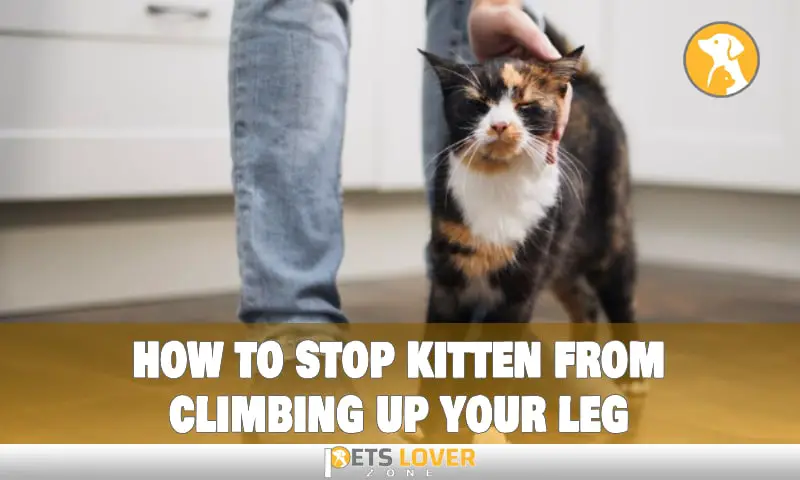It can be very distressing when your kitten cries out when you pick them up.
Kittens are generally very social and affectionate creatures, so it’s hard to understand why they might express distress when we try to hold them. The truth is that there could be a number of different causes for this behavior. It might be because the kitten is in physical pain as a result of an injury or illness, or it might be because the kitten is afraid or feels overwhelmed by the situation.
In this article, we’ll explore some of the possible causes of your kitten’s distress and provide tips on how to help calm her down. We’ll also discuss some common mistakes people make when dealing with a scared kitten, and provide advice for creating a safe and secure environment for her to relax in.
Your Kitten Is Still Getting Used to Being Handled
There’s no better feeling than the soft fur of a kitten in your arms. However, many kittens will cry when you first pick them up, and it can be upsetting.
The good news is, it’s totally normal—your kitten is still getting used to being handled. Most cats that have been handled early in their lives feel safer around humans since they associate people with being held, petted, and cuddled. But if your kitten was raised without much interaction with humans, she may be fearful or overwhelmed when held.
To help your little one feel more secure and less stressed when you pick her up, be sure to always use two hands. Start by gently supporting the chest and bottom area with one hand while the other hand supports her legs from underneath her body. This helps create a sense of security for her, so she doesn’t feel vulnerable or exposed. With time, patience, and love, your kitten will bond with you and look forward to spending time in your arms.
She May Feel Uncomfortable Being Restrained
Your kitten may not be able to understand why she needs to be held still. Even if you aren’t picking her up too tightly, having her body handled by a human can be overwhelming and scary. Emotional distress can trigger physical responses like freezing, crying out, or struggling.
Cats are 8.2 times more likely to struggle during full-body restraint than dogs, but this doesn’t mean that your cat can’t learn to feel more comfortable being held and handled. Studies show that cats may act aggressively to avoid touch, movement, or activities that may worsen the pain. They might think that being restrained leads to unpleasant experiences and become threatened by over-restraint.
To make your kitty’s experience with handling as positive as possible, always speak in a calm and gentle voice when you pick her up, and try petting her very lightly while you do so. This will help her feel secure in your arms, and she will start associating being picked up with something pleasant!
You’re Separating Her From Her Littermates Too Quickly
When kittens are separated from their mother and littermates before the age of 12-14 weeks, it can cause them a lot of distress. This is because they have not yet had a chance to properly learn communication and social norms from their mothers and siblings. Cats are very social creatures, and isolating a kitten too early can lead to health, social, and developmental issues.
To lessen your kitten’s distress when you pick her up:
- Allow her ample time to adjust to her new environment.
- Introduce her to other cats in the household or neighborhood (if there are any).
- Encourage play with toys that simulate hunting activities, such as ‘catfishing poles’, which replicate the motion of prey. This can help your kitten build confidence and associate interactions with pleasure.
- Provide her with plenty of outlets for mental stimulation such as scratching posts, puzzle toys, and cat trees so that she doesn’t become bored or stressed out as easily.
- Talk softly and offer treats often to build trust between you and your feline friend.
She’s Hungry or Needs to Use the Litter Box

Your kitten may also cry out to tell you she’s hungry or needs to use the litter box. Kittens that are under 8 weeks old meow before or during defecation, so it’s important to make sure her box is clean and accessible. If the area is uncomfortable or unclean, your furry friend may be too worried to do her business.
Kittens need multiple feedings throughout the day, so be prepared with a healthy option on hand when they start to cry. Whenever they start meowing, take her over to her food bowl and reward her with a tasty treat. If she doesn’t seem interested in food right away, try giving her some attention by petting her and talking soothingly to calm her down before getting started at lunchtime.
Seeking Attention or Affection
It may not always be obvious, but cats are incredibly social. If your kitten is crying when you pick her up, it could be that she’s trying to get your attention and seek some affection. Try spending some extra time with her; play with toys, offer treats, and practice gentle massages to show that you care.
When a cat is seeking attention or affection, it will often engage in certain behaviors to try to “win” its keeper’s affection. Cats will often meow more frequently than usual, seek physical contact more often, and become more persistent with their demands for attention. In addition, cats may present themselves in a way that encourages petting by curling up into a ball or rubbing against your legs or furniture. If your cat is displaying any of these behaviors, it could be a sign she just wants some quality time with you.
Be Patient and Give Her Time to Get Used to Interaction
Although kittens can be naturally inquisitive, it can take time for them to adjust to being handled or picked up. One of the many ways you can help your kitten get used to being handled is by introducing new textures and materials for her to explore. Providing a variety of textures for your kitty, such as a variety of toys and other items with different fabrics, will help her become more comfortable with tactile experiences.
Another helpful technique is positive reinforcement. By rewarding your kitten with high-value reinforcers like food or treats when she allows you to pet her or pick her up, she will gradually associate these experiences with something positive. This will also help her build trust in you as she learns that interaction isn’t a bad thing!
When introducing your kitten to new people and pets, it’s important to move slowly and speak softly so as not to overstimulate her. If you allow her the chance to observe and sniff people and other animals without trying to handle them right away, she’ll start feeling more relaxed and safe around them. Most importantly, always remember that it takes time and patience for a kitten who’s just moved into your home to fully adjust – so be patient and give her plenty of love!
Your Kitten Feels Anxious or Fearful
It’s possible that your kitten is crying out of anxiety or fear when you pick her up. Cats, like humans, experience anxiety when faced with unfamiliar or stressful situations. Some physical signs of cat anxiety can include trembling, rapid breathing, and frequent licking of the nose. Your kitten may also show signs of distress in her behavior, such as restlessness or aggression, pacing or hiding, or increased vocalization.
If your kitten feels anxious when you pick her up, it’s important to take steps to help her feel more comfortable and relaxed. Start by providing a safe and secure environment and keeping each interaction brief and focused on positive reinforcement. Reward her with treats when she remains calm during your interactions, building trust bit by bit. Use a soft voice and avoid sudden movements to reduce your kitten’s stress levels. Finally, be sure to take regular breaks – cats get overwhelmed too.
How to Help Your Kitten Get Used to Being Held
Getting your kitten used to being held might seem like a daunting task, but with a little patience and positive reinforcement training, it doesn’t have to be overwhelming. The key is to create an environment where your kitten feels safe and calm.
Here are some tips to help your kitten be comfortable when picked up:
- Offer rewards when they remain calm while being held, such as petting and light squeezing.
- Gradually work up to full holds by starting with short lifting sessions and rewarding them for their patience.
- Spend time gently petting the kitten prior to picking them up, which will help them relax before the experience starts.
- Speak in soothing tones throughout the process, reward good behavior, and provide comfort if your kitten is feeling anxious or stressed out during the experience.
- Repeat this process several times until your kitty becomes used to being held – it may take a few days or weeks depending on their personality and level of comfort with strangers.
She’s in Pain or Discomfort
Your first thought, when you hear your kitten cry when you pick her up, may be that she’s scared, but it’s just as likely that she’s in pain or discomfort.
Symptoms of pain or discomfort vary from cat to cat, but common ones include hiding, vocalizing, or hissing; aggression towards people and other cats; a lack of appetite; and rapid or shallow breathing. It can also be difficult to tell if a cat is in pain – they’re very good at hiding signs of injury or illness. However, changes in posture, behavior, and body language can all point to an underlying condition causing distress.
If your kitten appears to be in pain or distress when you pick her up – even if only occasionally – it’s best to seek veterinary advice as soon as possible. With the right care and attention, you can minimize the distress and help ensure your kitten is living her best life.
Tips to Help Calm Your Crying Kitten

It’s natural to feel distressed when your furry friend is crying out in distress. After all, you want to provide a comforting home for your cat! Here are some tips that can help calm your kitten when they become agitated:
Create a Routine
Creating a set routine helps kittens feel secure, as they know what to expect next due to these established patterns. This can be especially helpful for orphaned kittens who are missing the sense of security that comes from their mother and littermates.
Toys Are Necessary
Providing plastic chew toys specifically designed for cats gives them something to do when they are feeling anxious or overwhelmed. Chewing can have a soothing effect and give them an outlet for their pent-up energy. Additionally, wet washcloths or stuffed animals with battery-operated heartbeats can help provide comfort for orphaned kittens who need something to cuddle against.
Most Importantly: Provide Attention
Most importantly, spend quality time with your kitten every day – this will help strengthen the bond between you two and create comfort for both of you. With plenty of attention and care, your kitten will soon realize that there is nothing to fear when you pick them up or touch them.
Conclusion
Understanding why your kitten cries when you pick her up can help you prevent it in the future. There are a few key reasons that can explain a kitten’s fear and distress, such as a fear of being held, surprise, stress, or pain. Taking the time to recognize the problem and making sure your cat is comfortable being handled can help reduce her fear.
You can make your kitten feel safe and loved by providing plenty of positive reinforcement, such as by offering treats and playing with her. Additionally, providing a cozy hiding spot, such as a cat bed or covered bed, can help her feel more secure. Even if your kitten continues to cry when you pick her up, be consistent with your care and remember to always speak to her in a gentle, soothing voice. Through understanding and patience, your kitten will learn to trust you and eventually cease to cry when you pick her up.






